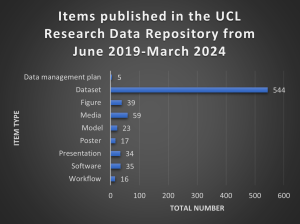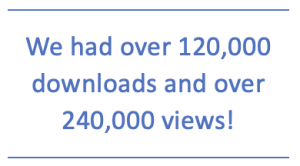Open Science and Scholarship at UCL: A Year in Review
By Naomi, on 24 October 2025
Each year during Open Access Week, we like to share an update about what’s been happening in the past year across the various teams supporting Open Science and Scholarship at UCL and beyond.
 This year, the Office for Open Science & Scholarship and UCL Press partnered with colleagues at The London School of Economics and The Francis Crick Institute to launch an inaugural London-based Open Science Festival, instead of our usual annual conference. Taking place from 2nd – 6th June, there were a range of online sessions, as well as in-person sessions hosted at UCL and LSE, covering subjects such as Authorship and AI, Open Access in an Age of Populism, and Creativity in Research and Engagement.
This year, the Office for Open Science & Scholarship and UCL Press partnered with colleagues at The London School of Economics and The Francis Crick Institute to launch an inaugural London-based Open Science Festival, instead of our usual annual conference. Taking place from 2nd – 6th June, there were a range of online sessions, as well as in-person sessions hosted at UCL and LSE, covering subjects such as Authorship and AI, Open Access in an Age of Populism, and Creativity in Research and Engagement.
Browse the full programme, read write-ups and watch recordings in this summary blog post.
We are delighted to share that planning has already begun for next year’s festival, with more London institutions joining to put together a programme with even wider reach. Watch this space!
Back in November 2024, the Office for Open Science and Scholarship fully committed to Bluesky, where our activity and following has increased over the last 12 months. From just over 200 followers at the end of October 2024, to a current total of 1,762 followers, it is fantastic to connect with a wide community engaging with Open Science. Our LinkedIn audience has also grown from 600 followers to over 1000, and it has been great to see more UCL students and staff engaging with our content on there.
Find us on LinkedIn and Bluesky if you’ve not connected with us yet!
Open Access
 Over the past 12 months, the Open Access Team has facilitated the Gold open access publication of over 3,500 papers across 40 transformative agreements with publishers. UCL Discovery has continued to go from strength to strength, with over 62 million downloads, reaching the 60 million milestone in July which we celebrated in this dedicated blog post. The publications repository now boasts over 196,000 open access items, including 26,100 theses, with over 11,500 uploads over the last year.
Over the past 12 months, the Open Access Team has facilitated the Gold open access publication of over 3,500 papers across 40 transformative agreements with publishers. UCL Discovery has continued to go from strength to strength, with over 62 million downloads, reaching the 60 million milestone in July which we celebrated in this dedicated blog post. The publications repository now boasts over 196,000 open access items, including 26,100 theses, with over 11,500 uploads over the last year.
UCL Press

Photo by Mat Wright, UCL Digital Media
This summer, UCL Press celebrated its 10th anniversary! To mark this significant milestone, an open access monograph panel event took place in person and online on 10th June, featuring speakers from universities and the publishing sector. UCL Press was launched in line with UCL’s commitment to open science and scholarship, and as the UK’s first fully open access university press, has to date published 423 books and 15 journals, surpassed 26 million open access downloads, and reached 242 countries and territories.
Discover how to publish your book, journal or journal article with UCL Press.
Copyright
It has been a busy year for the Copyright Team. In 2024-2025 we ran 36 sessions for UCL students and staff on a range of topics, including copyright for theses, publications, data, images, publishing contracts, and GenAI, continuing this year with a similar programme and offering bespoke sessions, too.
New resources included our Copyright and AI Libguide, our Getting Started with Copyright webpage, and the launch of our Copyright for Humans game: an engaging, playful and critical approach to copyright, which can be played in person or online.

AI-generated in Copilot with prompts by Christine Daoutis
As the new mascot, Colin the Copyright Literacy Nerd, will tell you, copyright education is much more than knowing about what the Copyright Act says or what a licence allows you to do. In April we launched the UCL Copyright Literacy Strategy 2024-2027, which sets out a vision and a plan of action to develop copyright confidence and understanding across UCL. One outcome of the strategy is our growing Copyright Literacy Community, which offers UCL staff and students opportunities to discuss copyright issues, share questions and best practice, and participate in collaborative projects.
For more information, contact the copyright team.
Citizen Science

Photo by Sheetal Saujani at this year’s Open Science Festival
This year marked a major milestone for Citizen Science at UCL, with our first community event bringing together UCL staff and students to exchange ideas and explore participatory research. In addition, we expanded our UCL Citizen Science Community on MS Teams to over 120 members and introduced the UCL Citizen Science Support Resources Hub, a collection of articles, tools, and guidance on different aspects of citizen science projects. The Office continues to support new UCL Citizen Science Academy training programmes leading to the UCL Citizen Science Certificate, ensuring consistently high standards across different cohorts. We have also very recently set up a UK-wide Citizen Science Enablers Network, a new initiative supporting groups and individuals interested in enabling Citizen Science at their own higher education institutions.
We’re committed to developing our support service for Citizen Science at UCL – one that empowers staff and students to run impactful projects and strengthens UCL’s position in Citizen Science.
Join our community and talk to us about your ideas and projects!
Research Data Management
 In the world of Research Data Management at UCL, the past year has been significant as the Research Data Repository surpassed the 1 million mark for both views and downloads, with the figures currently 1.3 million for views and 1.2 million for downloads. A fantastic achievement from the UCL Research Community. These views and downloads took place in over 190 countries and territories across the world, which demonstrates the wide-reaching impact of the Research Data Repository. There is currently an impressive total of over 1000 items published on the repository which we hope will continue to increase, along with the total views and downloads.
In the world of Research Data Management at UCL, the past year has been significant as the Research Data Repository surpassed the 1 million mark for both views and downloads, with the figures currently 1.3 million for views and 1.2 million for downloads. A fantastic achievement from the UCL Research Community. These views and downloads took place in over 190 countries and territories across the world, which demonstrates the wide-reaching impact of the Research Data Repository. There is currently an impressive total of over 1000 items published on the repository which we hope will continue to increase, along with the total views and downloads.
Find out more in the newly published RDR user guide.
The UCL DMP template has also been updated this year, and you can find more information on managing your research data across the research lifecycle on our webpages.
Bibliometrics

Photo by Lukas Blazek on Unsplash
The Bibliometrics team ran a full calendar of 12 scheduled training sessions in the Library Skills program as well as a large number of smaller individual sessions, including developing training and support for new tools such as OpenAlex and emerging citation analysis tools. A major theme this year was advising on using the new Overton service, which offers researchers a way to discover grey literature as well as to identify new impacts of their research. We also assisted a wide range of teams at UCL in their work to measure and report on UCL’s research activity and impact.
It’s been a fantastic year, and we’re looking forward to what the next one has in store – read along on this blog, sign up to our newsletter, and follow us on LinkedIn and Bluesky to keep up to date!
The UCL Office for Open Science and Scholarship invites you to contribute to the open science and scholarship movement. Stay connected for updates, events, and opportunities.
Follow us on Bluesky, LinkedIn, and join our mailing list to be part of the conversation!
 Close
Close




 conversations with 50 policymakers and practitioners from around England about their perspectives on the challenges facing young adults aged 15-20.
conversations with 50 policymakers and practitioners from around England about their perspectives on the challenges facing young adults aged 15-20. research publications via
research publications via 



!["We invite you to share your insights on the UCL Research Repository and help us improve our service! Take just 5-10 mins to complete a brief internal survey. Thank you! [Link: https://buff.ly/3Tg1Fna] Image: A figure with blue & green clothing with a speech bubble reading 'tell us what you think'.](https://blogs.ucl.ac.uk/open-access/files/2024/04/Copy-of-Pink-Minimal-Recruitment-Twitter-Post-1-5d3ce82295fad533-300x169.png)






